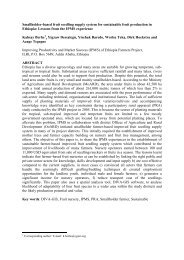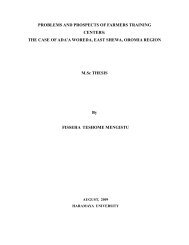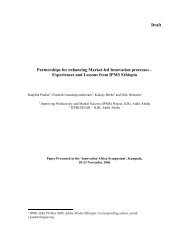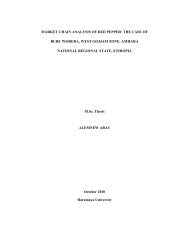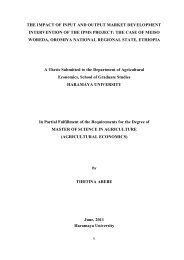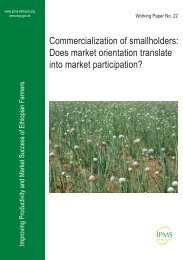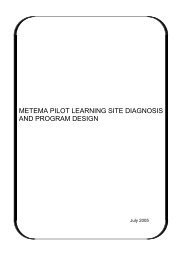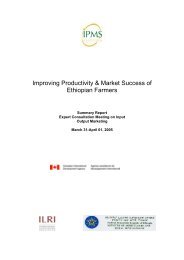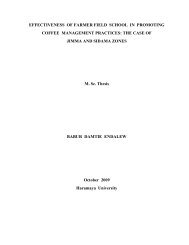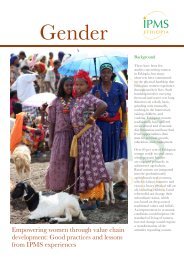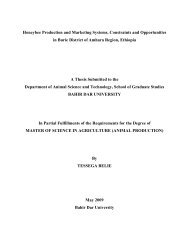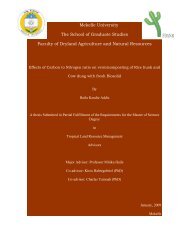effectiveness of modular training at farmers - IPMS Information ...
effectiveness of modular training at farmers - IPMS Information ...
effectiveness of modular training at farmers - IPMS Information ...
Create successful ePaper yourself
Turn your PDF publications into a flip-book with our unique Google optimized e-Paper software.
Modular <strong>training</strong> was supposed to given for those <strong>farmers</strong> who are grade four and above. Thisis because the trainees can understand the content <strong>of</strong> the text. After the <strong>training</strong>, <strong>farmers</strong> areexpected to run their own enterprise on their field so th<strong>at</strong> not only knowledge and skillacquired by trainees but also different income gener<strong>at</strong>ing schemes can be raised throughdifferent commodities <strong>of</strong> animal, crop and n<strong>at</strong>ural resource as a means <strong>of</strong> pr<strong>of</strong>its (BoARD andSWHISA, 2006).Training is used to improve the performance <strong>of</strong> individuals and social purposes in addition toget the job done effectively and for the improvement <strong>of</strong> productions (Spring, 2002; Pitchai,2005). Adebebey, et al. (2008) pointed out th<strong>at</strong> FTCs assist <strong>farmers</strong> to make good decisions,leading to optional use <strong>of</strong> their resources and efficient use <strong>of</strong> w<strong>at</strong>er and other resources.Furthermore, <strong>training</strong> has additional benefits for moral building, individual motiv<strong>at</strong>ion,financial gain, capacity to develop new technologies and methods, leads to higherproductivity or pr<strong>of</strong>it, increase the quality <strong>of</strong> output and customer s<strong>at</strong>isfaction and fosterdynamic and forward looking. Training helps a business run better, adds flexibility andefficiencies in processes. Training is essentials for knowledge transfer, gives seasonal workand an investment in a company. It can also give a better service to clients (Pitchai, 2005;YICDOL, 2008).2.7. Institutional LinkageInstitutions are, whether organiz<strong>at</strong>ions or not, complex <strong>of</strong> norms, rules <strong>of</strong> conduct andbehaviors th<strong>at</strong> persist over time by serving collectively valued purposes. Institutions medi<strong>at</strong>ethe rural poor access to knowledge service, market, employment, str<strong>at</strong>egy and livelihoodassets. For instance, Debo, Wonfel, Senbete, Mahber, Idir (funeral groups), Jigie (work orlabor saving groups), Iquob (saving and loan type <strong>of</strong> groups), w<strong>at</strong>er user associ<strong>at</strong>ions andother traditional and cultural institutions and informal organiz<strong>at</strong>ions th<strong>at</strong> help to dissemin<strong>at</strong>eand g<strong>at</strong>hering inform<strong>at</strong>ion (Dejene,1999; Ellis, 1999).21



